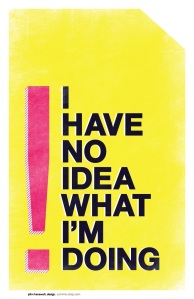 Tomorrow will mark month two of my post-academic adventure as an instructional technologist. I’ve been adjusting to a new schedule, new colleagues, new responsibilities, and overall different lifestyle. I thought I was mentally prepared for the transition. I wasn’t.
Tomorrow will mark month two of my post-academic adventure as an instructional technologist. I’ve been adjusting to a new schedule, new colleagues, new responsibilities, and overall different lifestyle. I thought I was mentally prepared for the transition. I wasn’t.
In fact, I feel like a fraud.
Imposter syndrome is not new to me. For much of the five years of grad school and eight years as a professor, I frequently felt like I was pretending to be an intellectual and at any moment, the Ivory Tower Police would discover my secret and disrobe me. But those moments of self-doubt are nothing compared to how I feel now.
Don’t get me wrong–I’m enjoying my new position immensely and I’m also impressed by how much I’ve already learned. I’m not totally down on myself! But a couple times a day I’m reminded of how much I don’t know. Last week, I was leading a small group training session on Twitter for a group of faculty and one asked me why users are limited to 140 characters. “It just seems like such an arbitrary number. What’s the back story?”
Shit.
I don’t know.
That’s something I should know.
I smiled and tried to maintain my confident facade. “That’s a great question! I actually don’t know but I’ll look it up after our session and e-mail you.”
Dummy. How do you not know that?
And so it goes.
I am getting better at re-framing my negative thoughts, but I still worry that my new boss will pull me into his office and say he made a mistake offering the position to me. What if he realizes I don’t know how to use Dreamweaver? Or that I only learned how to screencast last month? Or that I have no idea how to code? I’m not even competent with Excel formulas!
As debilitating as these thoughts can be, however, I must admit that imposter guilt is a fantastic motivator. I’ve spent hours watching You Tube tutorials, scanning Lynda.com, peppering my Twitter PLN with questions, and clicking a lot of buttons. So in some ways, managing my imposter guilt has been productive. But I do look forward to the day I no longer worry about being “found out.” Until then, I hope my enthusiasm carries me through.
Have you experienced imposter syndrome? How did you cope?
Further Reading:
If you’re curious: why Twitter users are limited to 140 characters
Forbes: “Afraid of Being Found Out? Overcoming Imposter Syndrome”



I think everyone feels this way in a new job. In fact, the day you finally feel proficient will probably be the day you say, “I’m bored. I need a new job.” 🙂
Ha! That’s a fantastic point! One aspect of the new job that I really enjoy is everyone is continuously learning about new tools since technology is always evolving. So the culture has been built around an appreciation of curiosity and exploration. That reassures me when I have my “imposter moments.” And thank you for tweeting about this post. I really, really appreciate that.
The worst part of imposter syndrome, especially in academia, is that you feel like it’s not a syndrome, rather, you feel as if it’s unique to you. I remember the first few conferences I went to as a grad student, surrounded by intellectual mammoths to whom I felt I could NEVER measure up. I’ve since learned that I wasn’t alone in feeling this way (and that some scholars shouldn’t be let out of the house, so they are humans as well) but imposter syndrome, for me, was one of the absolute worst aspects of the academic experience. The constant, unyielding (if necessary) criticism that goes with the dissertation experience seriously makes you feel inadequate, even when you finish! Even now that I’m basically out of official academia, I’m still dealing with imposter syndrome’s after-effects. But things get better with each passing day.